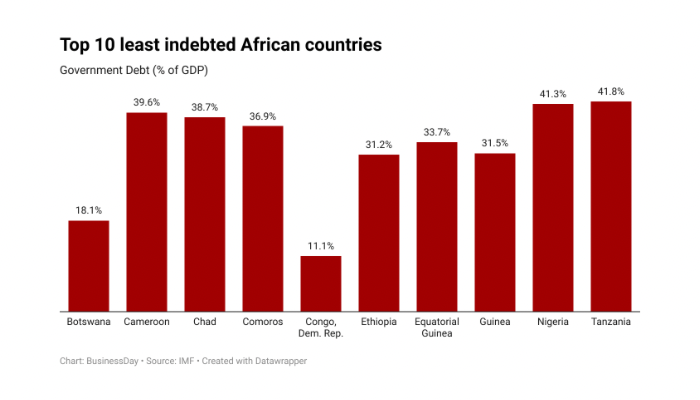The African countries, face challenges in securing debt relief due to mismanagement of resources, and its emphasizes the need for prudent leadership, cautioning against the debt trap, and encourages qualities such as setting examples and courage in decision-making for effective leadership…
The debt-to-GDP ratio is an important metric that compares a country’s total debt to its economic output, with lower ratios indicating economic stability and higher ratios signaling potential challenges in meeting debt obligations, influencing global investor decisions, and influencing interest rates on government bonds.

According to the International Monetary Fund (IMF), Here are Africa’s top 10 least indebted countries
Tanzania (41.8% Debt-to-GDP Ratio)
Tanzania takes the lead among Africa’s least indebted nations with a debt-to-GDP ratio of 41.8%. The East African nation’s relatively low ratio indicates a balanced monetary approach, contributing to economic stability and resilience.
Nigeria (41.3% Debt-to-GDP Ratio)
While being a significant player on the African economic stage, Nigeria surprised with its debt-to-GDP ratio of 41.3%. The country’s diverse economic sectors and efforts to manage debt contribute to its position among the least indebted nations.
Cameroon (39.6% Debt-to-GDP Ratio)
Cameroon’s debt-to-GDP ratio of 39.6% demonstrates the country’s commitment to maintaining fiscal discipline. Despite dealing with separatist unrest and economic crises, the country has maintained strict control over government expenditures. Prudent handling of oil income, a critical resource, has also aided budgetary stability.
Chad (38.7% Debt-to-GDP Ratio)
Chad, with a debt-to-GDP ratio of 38.7%, reflects a balanced approach to managing financial obligations. A nation emerging from years of internal war has made an astonishing comeback. Debt restructuring initiatives and more openness in resource management have been critical.
Comoros (36.9% Debt-to-GDP Ratio)
Comoros exhibits prudent fiscal management with a debt-to-GDP ratio of 36.9%. is an example of a small island nation’s debt management. Tourism and agriculture drive the economy, but prudent foreign aid utilization and an emphasis on internal resource mobilization have kept debt at bay. The dedication of the Comoros to good administration and budgetary control lays the way for a brighter future.
Equatorial Guinea (33.7% Debt-to-GDP Ratio)
Equatorial Guinea’s debt-to-GDP ratio stands at 33.7%, showcasing the country’s strategic approach to financial policies. Its oil wealth could easily lead to overspending, but this small nation is proving otherwise. Strict control over oil revenues, along with investments in non-oil sectors like agriculture and tourism, has kept its debt in check.
Guinea (31.5% Debt-to-GDP Ratio)
Guinea’s debt-to-GDP ratio of 31.5% reflects the West African nation’s efforts in maintaining fiscal responsibility. Emerging from years of political instability, Guinea is focused on responsible resource management. Diversifying its economy beyond mining, coupled with prudent budgeting, has paved the way for fiscal stability.
Ethiopia (31.2% Debt-to-GDP Ratio)
Ethiopia’s debt-to-GDP ratio of 31.2% highlights the East African nation’s resilience in managing financial obligations. Large-scale infrastructure projects, coupled with investments in education and healthcare, are driving growth while keeping debt under control.
Botswana (18.1% Debt-to-GDP Ratio)
Botswana stands out with a remarkably low debt-to-GDP ratio of 18.1%, showcasing the Southern African nation’s prudent economic management. Botswana sets the gold standard for debt management. Careful planning, robust institutions, and a focus on long-term development have made it Africa’s second-least-indebted country
Congo, Dem. Rep. of the (11.1% Debt-to-GDP Ratio)
The Democratic Republic of the Congo boasts the lowest debt-to-GDP ratio among Africa’s least indebted countries, standing at 11.1%. The nation’s vast natural resources and efforts in managing debt contribute to its economic stability.




